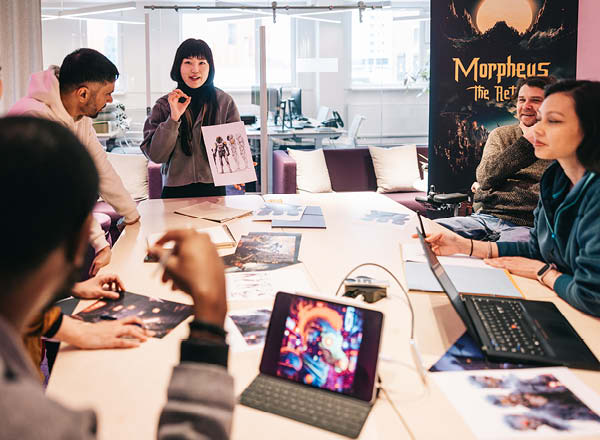Game designers and developers combine creativity and technical skills to create the sword-swinging, sniper-aiming, cart-driving, turnip-farming games we all love. With 81 per cent of Australians now playing video games, and the gaming industry reaching a net worth of more than $4 billion, the job outlook for a career in video games is pretty great and only getting better.
How to become a game developer
But if you want to create games, not just play them, how do you become a game dev? Hold that joystick; we’re going to break it down.
Step 1: Start developing essential skills
- Practice your coding in different programming languages. Game developers use a variety, with the most popular being C++, C# and Java. Coding bootcamps can teach essential skills and help you gain experience.
- Get qualified. Almost any of our IT and computing degrees will have some transferable skills for the games industry. You’ll gain a wide range of computer programming skills and foundational knowledge across information technology, data analytics and data science, mathematics and software development. Plus, you can choose electives that fit your career goals – like game developing.
Step 2: Gain practical experience
Build a strong portfolio to showcase your abilities. It could include work on personal completed projects, participation in games development competitions, or contributions to open-source game projects that required writing code.
If you can score an internship or entry-level position at a gaming studio like Electronic Arts or Ubisoft, or even with an indie developer, you’ll get some sweet hands-on video game design experience too.
Step 3: Build your network
Put yourself out there. Networking within the gaming industry is crucial for aspiring game programmers. Attending industry events, joining game development communities like the International Game Developers Association or the Entertainment Software Association, and connecting with professionals through online platforms can give you valuable insights, mentorship opportunities and even potential job leads.
What does a video game developer do?

The clue is in the name: game developers are the people who conceive and then bring to life digital worlds and interactive experiences across different platforms and devices. They work with multidisciplinary teams to devise games – and then translate those creative visions into functional gameplay mechanics.
Game developers bring ideas to life on the screen. If you pursue a career as a video game developer, you’ll leverage emerging technologies to build interactive game systems, user interfaces, virtual reality, artificial intelligence behaviours and networking functionalities. All while ensuring the game is smooth and responsive.
Moreover, video game developers are involved in the game design process. They help shape the overall gameplay experience and user interactions. This could mean level design to map the way a game world unfolds. Designing the puzzles and challenges a player has to navigate. Making sure the game is difficult enough but not impossible to keep gamers entertained. And constantly reiterating designs based on feedback from across the team. With something as nuanced and expansive as a video game, there’s a lot of tweaking involved!
What tools do game developers use to program?
So, let’s get into the bytes and binary. Game developers rely heavily on integrated development environments (IDEs) and game engines. IDEs such as Visual Studio, JetBrains Rider, and Eclipse provide powerful tools for coding. Game engines like Unity, Unreal Engine, and Godot offer tools like rendering engines, physics engines, audio systems and asset pipelines. Think of them as giving you some pre-made blocks of code for specific game functions, so you don’t have to start from scratch every time.
Video game programmers also use graphics libraries like OpenGL and DirectX to create visuals, audio middleware such as FMOD and Wwise to build audio elements into games, and game development frameworks like SDL and SFML to simplify cross-platform development, ensuring compatibility across different devices and operating systems.


What skills do game developers need?
Okay, so we’ve covered the technical skills you need to ace it as a gaming programmer. What other soft skills will put you in the driver’s seat of your career?
Well, firstly, no surprises – creativity! Coming up with new ideas, compelling characters, cutting-edge game-play and new experiences for players is really the key for building interesting, playable games.
Next up, problem-solving. There are always going to be curveballs and glitches along the way when it comes to video game developing. Being able to identify and resolve issues to optimise the game-playing experience is key.
And communication and collaboration skills. Designing and developing video games is a collective endeavour, and strong interpersonal skills make for productive teamwork.
A bit of career advice: you can study online to take short courses that expand on these soft skills to make yourself super valuable to video game publishers, and ensure you’ve got the skills for video game development as a long-term career.
Where do game developers work?

There are three primary places to build careers in video games: large game publishers, indie game development and freelance game programming.
In larger game development studios, you’ll collaborate with development teams in the same space. You’ll get to meet people who are specialists in many different game production niches, like software engineers, user experience or UX designers, art animation designers or even artificial intelligence (AI) and machine learning game designers. Once you’ve found a games design and development job description you gravitate to, you can specialise your talents further to really make a name for yourself in the video game industry.
Indie games developers often work in more flexible environments with much smaller production teams. It’s likely to give you the chance to wear more than just your game designer hat; you might also get involved with digital marketing or being a quality assurance (QA) tester. You may also find yourself as a project manager, leading a team of fellow designers and developers — a great chance to practice your management and leadership skills.
A freelance game developer career offers you independence and the opportunity to develop games in diverse projects, even work on international games. However, it does require self-discipline, time management skills and the ability to market yourself effectively.

Ready to power up your career in game development?
Chat to our team of uni advisers to get all the answers. They can also help with your application.
Frequently asked questions
What kind of degree do I need to become a game developer?
While there are no specific degrees required for game design, a degree in computer science, computer engineering or a related field will help you immensely with the technical skills required to develop games. A Charles Sturt IT degree will put you on the right path toward a career in gaming and games development. You could even study to become a web developer and go from there, or bring over artistic skills from a graphic design degree. The options are as varied as there are game genres!
What does a day in the life of a game developer look like?
Game development jobs are some of the most unique out there. On a small scale, your job will be consistent day-to-day, focused on coding and play-testing. On a large scale however you’ll come across something different every day. No matter what role you take on, teamwork is a big part of the job and you’ll probably find yourself working alongside developers, designers and artists.
But there’s one thing that’s true for every game developer’s day, and it’s the fact there will be coffee – lots and lots of coffee!
What kind of salary does a game developer earn?
Game developer salaries can vary depending on experience, the type of role, the game company you’re working for and your location. But according to SEEK, the average annual salary for video game developers in Australia ranges from $90,000 to $110,000 a year.


You must be logged in to post a comment.